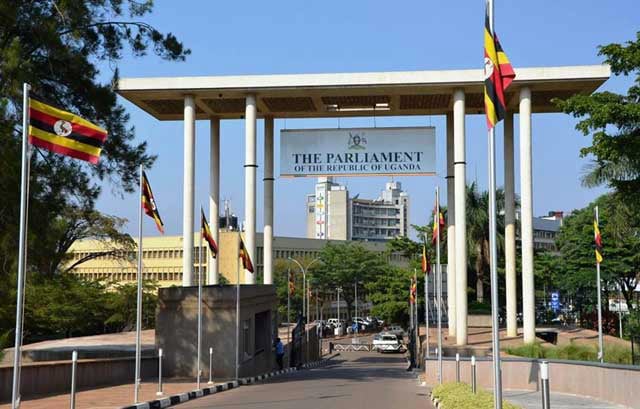
Civil Society Budget Advocacy Group Executive Director Julius Mukunda (right) appears before the Legal Committee of Parliament yesterday. PHOTO | DAVID LUBOWA
Stakeholders have asked Parliament to stop government’s plan to merge six entities. In separate presentations made before the Committee on Agriculture and the Legal and Parliamentary Affairs committees, stakeholders expressed concern that the challenges crippling service delivery and efficiency in various ministries would get worse if agencies were sent back to their line ministries.
In a written presentation reflecting the position of the civil society members, the Executive Director of the Civil Society Budget Advocacy Group (CSBAG), Mr Julius Mukunda, opposed the plan to merge of the Equal Opportunities Commission (EOC) and Uganda Human Rights Commission (UHRC).
Mr Mukunda told lawmakers on the Legal and Parliamentary Affairs Committee that “civil society is united in opposition to the proposed merger of the Uganda Human Rights Commission (UHRC) and the Equal Opportunities Commission (EOC) grounded in the distinct and vital roles these agencies play in safeguarding the rights and opportunities of marginalised groups in Uganda.”
He urged the MPs “not to allow the invaluable work of the EOC to be overshadowed or diluted” but instead encourage government to focus on "strengthening state institutions to better serve all Ugandans, particularly those who are marginalised."
His proposal was seconded by a section of legislators, including Erute South Legislator Jonathan Odur, who reasoned that the merger would lead to abolishing or phasing out of EOC and its functions.
"In this Bill, whereas they seem to suggest that they are going to do a merger, but the proper analysis means that they are abolishing the Equal Opportunities Commission (EOC). So we cannot say that it is a merger,” he said.
Alternatively, Mr Mukunda said that “If merger must occur, we urge that the new entity be named the Equal Opportunities and Human Rights commission, rather than the proposed name.”
In another presentation, the Head of the Department of Law Reporting, Research and Law Reform at the Law Development Centre (LDC), Mr Paul Mukiibi, cautioned against the merging of the Uganda Law Reform Commission (ULRC) with the Ministry of Justice and Constitutional Affairs.
“We recommend that Uganda Law Reform Commission be left as an independent commissioned and not merged with Ministry of Justice because the ministry already has its big docket that it is struggling with,” Mr Mukiibi told the committee.
Buganda, Bugisu defend UCDA
In another interface between the committee on Agriculture, lawmakers from Buganda and Bugisu sub-region opposed government’s plan to strip the Uganda Coffee Development Authority (UCDA) of its autonomy and have it housed under the Ministry of Agriculture.
“I chair the Public Accounts Committee, which has looked at the performance of the Ministry of Agriculture and in all the parameters we looked at, it is one of the most incompetent and it has failed on almost everything. Actually, it wasn’t scoring a zero, it was scoring a minus in so many endevours,” the chairperson of Buganda Parliamentary Caucus, Mr Muwanga Kivumbi, said.
Several efforts have been made by a large section of MPs to retain UCDA, including resolution by the National Resistance Movement (NRM) Parliamentary Caucus made recently in a meeting chaired by President Museveni at State House Entebbe. The meeting, among others, resolved to give the UCDA a three-year period to effect key changes that could affect transactions of Uganda’s coffee on a global stage.
This was, however, questioned by other lawmakers, including the Nakaseke Central MP, Mr Allan Ssebunya Mayanja, who claimed that “the government isn’t giving a justification for the three years. Why not five, why not 10 years? Why not 20 years? Why are we legislating in anticipation? Therefore, I request that we maintain the status quo and we reject this Bill.”
Similarly, the chairperson of Bugisu Cooperative Union, Mr Nathan Nandala Mafabi, expressed fear that the proposed three-year period would not be enough for the government to adjust accreditation processes that enable Uganda’s coffee to get sold on the international market.
“What you do, you send your coffee, UCDA does the capping and after that, it gives certification and that certification, because it is the one that is allowed and then it comes and seals your container, that container is communicated in the system worldwide. Now, where that coffee is going, that country will confirm if that seal is from UCDA before they can accept that coffee in that country,” Mr Mafabi said.
TAX APPEALS TRIBUNAL
The proposal to merge Tax Appeals Tribunal with Electricity Disputes Tribunal to form the National Tribunal was opposed by the chairperson of the Tax Appeals Tribunal, Ms Chrystal Kabajwara. She, among others, stated that the union would not perform its desired tasks if qualifications of the members required to oversee and discharge duties on the National Tribunal are not harmonised. For instance, it was noted the Tax Appeals Tribunal Act stipulates that for one to be a member of the Tax Tribunal, he or she must have a lawyer or accountant while members of the Electricity Disputes Tribunal must have qualifications in electricity distribution, transmission and administration. “So there is need to harmonise the qualifications because you can’t have a tax person, listen to electricity disputes. So you need to widen the scope of qualifications,” she said.




